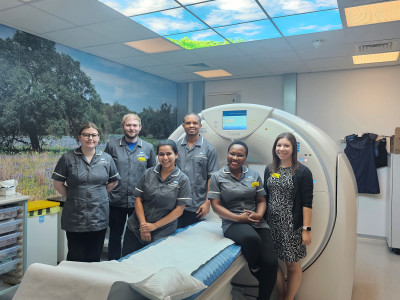
Patients are receiving access to diagnostic scans sooner thanks to the introduction of new safety training for radiographers.
A contrast scan is one where a substance is injected into an intravenous (IV) line and enables organs or tissue to be seen more clearly. These scans are often used to diagnose serious conditions, such as cancer. Normally on-site medical presence is required due to the potential risk of a patient having a severe allergic reaction to the fluid.
But radiographers at the community diagnostic centre (CDC) based at Finchley Memorial Hospital have undergone intensive training, enabling them to respond and administer adrenaline if a patient has an adverse reaction.
This has been a game-changer for the service. Previously the contrast scans could only be delivered for six hours a day Monday to Friday, corresponding to when medical cover was available. Now the scans can be delivered 10 hours a day seven days a week, enabling faster turnaround times for diagnosis and starting treatment.
Chloe Goodman, the operations manager at the CDC who led on the project, worked alongside the RFH resuscitation team, Resuscitation Council UK and the Society of Radiographers, to put the new safety policy in place and introduce a comprehensive training plan. Chloe was supported by Dr Ash Saini, clinical director for imaging and Mary Emerson, nurse consultant for critical care and the patient at risk and resuscitation team.
Chloe said: “This has been a really satisfying piece of work for everyone involved. Staff have embraced the chance to increase their skills and scope of practice. We now deliver twice as many contrast scans each week across CT and MRI than we did previously, which ultimately means patients can start their treatment sooner.
“Patient safety is our absolute priority. We expanded the hours over time to ensure staff were comfortable with their new responsibilities and we receive on-going support from the NCL Imaging Academy with simulation training and additional training from the resuscitation team. Staff can also practice as much as needed, under nursing supervision, with a phantom kit for needle placement to ensure their training becomes muscle memory. We have already experienced one adverse reaction since this new system was introduced but staff took prompt action and the patient made an immediate recovery.”
Mary said: “Anaphylactic reactions to intravenous contrast are rare but life-threatening and require prompt life-saving treatment. This is a good example of how staff from any professional background can be prepared and supported to manage a clinical emergency swiftly and safely. It has been a pleasure working with the CDC team in training and simulations and great to see how well they all performed in real life.”
 Translate
Translate